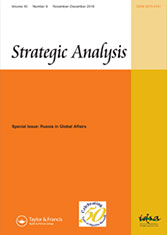Latin America
South America’s ‘Lithium Triangle Countries’ and Green Transition
The Latin American countries of Argentina, Bolivia and Chile have emerged as the lithium bank to fuel green transition.
- Priyanshi Agrawal
- August 17, 2023
India and Mexico: Celebrating 70 Years of Diplomatic Relations
India and Mexico can jointly push for an effective response to international terrorism, reforming the multilateral system, and the adoption of a comprehensive approach to promoting international peace and security.
- Ruchita Beri
- August 20, 2020
The Unlikely Friends: Iranian–Latin American Relations and Washington’s Anxiety
Although Iran and the Latin American states appear to be unlikely allies when considering the vast distances and the religious, cultural and demographic differences between these regions, their shared experience of Washington’s hegemonistic designs have brought them closer. Washington’s failure to isolate Tehran has meant that the Islamic Republic, and Hezbollah, have prioritised relationship-building with states that are at the doorstep of the US. Although this has antagonised the US, Washington has only offered a weak reaction to the economic and geopolitical advances made by Iran.
- Paul Antonopoulos
- March 2018
India’s Relations with the Latin America-Caribbean Region: Prospects and Constraints
This paper seeks, from a Latin American perspective, to examine India's relations with the Latin America-Caribbean region. It makes a distinction between the hesitant and somewhat apathetic approach of the Indian government towards enhanced ties with the region and the rather more proactive and enthusiastic approach by the Indian business sector which has seen Indian trade with the region growing many fold and increasing at the same rate as China's.
The Protracted Brazilian Crisis
In the backdrop of various corruption scandals marring the political scenario in Brazil, the 2018 general elections will probably be marked by uncertainties and contradictions of the competing coalition politics.
- Erik Ribeiro
- July 21, 2017
Subsystemic Unipolarities? Power Distribution and State Behaviour in South America and Southern Africa
This article explores the possibility of conceiving South America and Southern Africa as subsystemic unipolarities under Brazilian and South African primacy, respectively. It argues that this concept, when applied to these regions, sheds light not only on the long-term strategies behind the Brazilian and South African foreign policies towards their neighbourhood, but also on the behaviour of secondary regional powers and small states. This hypothesis questions the maxim that considerations related to polarity affect great powers only.
- Luis Leandro Schenoni
- January 2017
The State of the Smaller Latin American Air Forces
While the larger air forces are capable of sustaining their existing and future inventories for some time to come, the combat assets available to the region’s smaller air forces are facing a problem of pending obsolescence.
- Sanjay Badri-Maharaj
- December 22, 2016
More Latin American Air Forces Prepare to Resume Shooting Down Narco-Trafficking Aircraft
The policy of shooting down aircraft suspected of narco-trafficking is one fraught with problems without any tangible impact on the narco-trade.
- Sanjay Badri-Maharaj
- October 05, 2016












